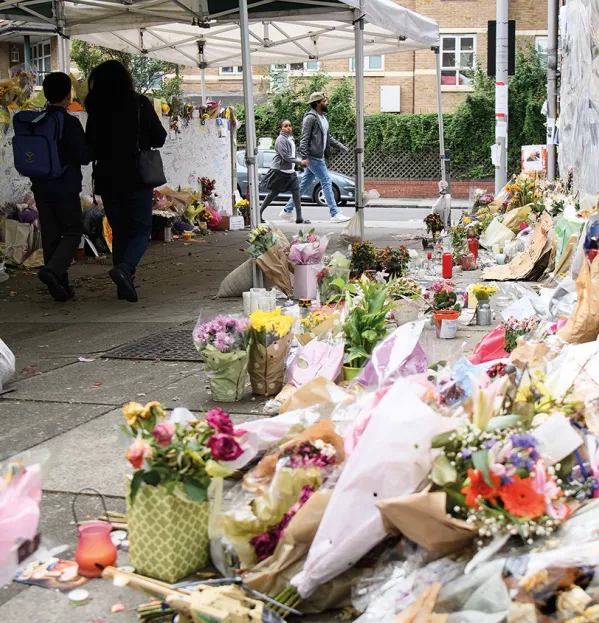‘Let pupils learn from disaster’

Schools fail their pupils if they do not discuss disasters such as the Grenfell Tower fire and the reasons behind them, according to one of the foremost thinkers on education in modern times.
Radical academic Henry Giroux, who was in Scotland to collect an honorary doctorate, warned that schools and other educational institutions were “irrelevant” if they merely taught a collection of skills without paying heed to the political forces shaping the world.
“What happens when you’re a student in a school and you turn on the media after you leave and there’s a building burning in your neighbourhood and people are jumping out of the windows?” he asked. Students, he said, should not return to school the next day to be greeted with “a kind of silence about a form of violence that has taken place”.
The Grenfell Tower disaster, he argued, was merely an extreme example of “neoliberal capitalism that thrives in creating unsafe conditions for people”. If schools ignore such events and the forces that make them possible, he said, “school becomes irrelevant - it becomes dead time”.
Defending democracy
An event entitled “In Conversation with Henry Giroux: rethinking education in the age of emergent authoritarianism” was held at the University of the West of Scotland this month after the Canada-based scholar got his honorary doctorate from the university.
The author, who advocates radical democracy, said that if schools do not help students to navigate a fast-changing world by encouraging “collective endeavour” and teaching that democracy was not a given but something that had to be struggled for, they would be more vulnerable to “a culture which says that the only obligations of citizenship they have are to shop and to use their iPhone and go online”.
Schools have to help young people to “learn how to govern and not to be governed”, as passivity is dangerous in a world where “fascism is coming out of the closet” and is now “right in your face”, said Professor Giroux.
He added that there is no room for complacency in education when people in power are seeking to build walls and exploit the ongoing refugee crisis with “despicable language of hate and bigotry” that normalises a sense of exclusion between different groups of people.
Education should be a “public good” and have influence far beyond educational institutions, he argued, but in reality it is frequently falling short: academia in North America, for example, has become “incredibly irrelevant”, he claimed.
On the state of education research, Professor Giroux, named in 2002 by the publisher Routledge as one of the top 50 educational thinkers of modern times, said: “People are writing books for five other people … instead of professors being renowned for their way to move the public and who prove that education is a public good.”
Educators have to ask themselves “the most central question of all - what’s the role of education?”, he suggested. They should also question whether pedagogy actually “makes a difference”. Schools, he added, should not remain passive in the face of spending cuts but ask, “How do you fight the forces that are imposing austerity measures on the school?” Similarly, teachers must “teach young people that they don’t have to be simply consumers, they can also be socially engaged citizens”.
‘Socially engaged’ citizens
In the end, Professor Giroux said, pedagogy comes down to a “fight” over how to define students’ role as “agents in the world” after they leave school.
He also questioned any definition of literacy as merely a collection of skills and knowledge to accumulate; instead, true literacy is about enabling young people to “intervene in the world” and not be governed by others.
He said he feared, however, that literacy is often reduced to “deconstruct this, understand that text”. There was “nothing wrong with that”, he explained, as long as students then learned how to influence the world through a “collective sense of agency” - education as a “recipe of methods” was not enough.
University of the West of Scotland education lecturer Diarmuid McAuliffe, who interviewed Professor Giroux at the event, told Tes Scotland that his guest showed how events like the Grenfell disaster can make concepts such as citizenship and democracy “real and meaningful” for students.
He added: “For Giroux, no curriculum - including Curriculum for Excellence - should ever be simply passively received, but instead should be critically responsive to contemporary events such as Grenfell.”
You need a Tes subscription to read this article
Subscribe now to read this article and get other subscriber-only content:
- Unlimited access to all Tes magazine content
- Exclusive subscriber-only stories
- Award-winning email newsletters
Already a subscriber? Log in
You need a subscription to read this article
Subscribe now to read this article and get other subscriber-only content, including:
- Unlimited access to all Tes magazine content
- Exclusive subscriber-only stories
- Award-winning email newsletters